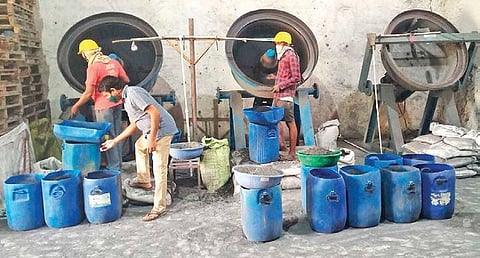

BHAWANIPATNA: Throw Bibhu Sahu a problem and he will mostly likely create an innovative business model. Twenty years ago, when most of his fellow villagers were cultivating paddy, the 20-something went into rice milling. Decade and half later, when rice husk waste from his mill drew resistance from locals, he turned the ash into gold.
Today, the 40-year-old from Kalahandi’s M Rampur supplies rice husk ash (RHA) pellets to steel industries in Egypt, Ukraine and Taiwan and is exploring opportunities in Japan, Germany and Australia. That’s not all. His waste to pellet model has drawn recognition not only from steel makers across the world but also from R&D bodies.
The journey started on a modest note as a para teacher for Sahu. After completing BSc from M Rampur College, he pursued CT training and joined as a para teacher in 2000. However, the dream of owning a venture was compelling and he quit the job two years later.
With farmers of the area mostly cultivating paddy, Sahu saw an opportunity. He took loan and opened a rice mill at Pandkamal village located in the aycut area of Utei medium irrigation project.
Problems started in 2017 when some locals objected to his dumping of RHA, the waste generated after processing paddy, at a nearby land.
They alleged that the waste was causing air pollution. “It was a bitter experience but also a blessing in disguise as it forced me to think of alternative ways to use the husk ash,” he says. Sahu used to transfer the ash into gunny bags and place them in his unused 1,000 sq ft godown near the mill. Soon, the godown ran out of space considering the large quantity of RHA produced daily.
Sahu had to look for options and searched the internet where he came across a research paper which said that RHA contains 85 per cent silicon and the granules generated from it can be used in steel industries besides, tyres and pesticide manufacturing units. With its fine insulating properties having high melting point and low thermal conductivity, RHA is widely used in steel industry to produce high quality steel. It is also used during casting metals to support slow cooling process and coating molten metals in steel industry, the research paper mentioned.
To explore the opportunity, Sahu sent small samples of RHA generated from his rice mill to different steel industries and in the early 2018, he was invited by EZDK - the first steel plant in Egypt - to demonstrate its use in production of steel. Impressed, the company handed him an order of supplying granular pellets of the RHA which would not result in pollution. However, he didn’t have machines to generate pellets on a commercial scale. “There were no machines available across the country to generate RHA pellets.
Some companies assured me to make the machinery but failed “, recalls Sahu who hired local potters and a blacksmith to prepare a machine that can serve the purpose. After unsuccessful trials, they designed a machine which could successfully make tiny balls of RHA. They made two more similar machines and Sahu hired all of them for generating RHA pellets.
He did not just meet the EZDK demand with the indigenous designs, he also applied for patent, trademark and design certification for the machinery and know-how of generating RHA pellets at the National Research Development Corporation, Visakhapatnam which were granted. The same year, his innovation was also recognised by Startup Odisha which sanctioned Rs 15 lakh to him for developing the model. Besides, CRRI at Cuttack provided him another Rs 24 lakh for the purpose.